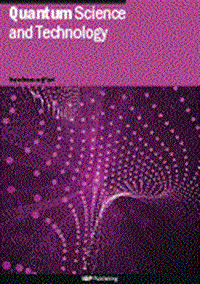Benchmarking a wide range of optimisers for solving the Fermi–Hubbard model using the variational quantum eigensolver
IF 5
2区 物理与天体物理
Q1 PHYSICS, MULTIDISCIPLINARY
引用次数: 0
Abstract
We numerically benchmark 30 optimisers on 372 instances of the variational quantum eigensolver for solving the Fermi–Hubbard system with the Hamiltonian variational ansatz. We rank the optimisers with respect to metrics such as final energy achieved and function calls needed to get within a certain tolerance level, and find that the best-performing optimisers are variants of gradient descent such as Momentum and ADAM (using finite difference), SPSA, CMAES, and BayesMGD. We perform gradient analysis, and observe that the step size for finite difference has a very significant impact. We also consider using simultaneous perturbation (inspired by SPSA) as a gradient subroutine: here finite difference can lead to a more precise estimate of the ground state but uses more calls, whereas simultaneous perturbation can converge quicker but may be less precise in the later stages. Finally, we study the quantum natural gradient algorithm: we implement this method for one-dimensional Fermi–Hubbard systems, and find that whilst it can reach a lower energy with fewer iterations, this improvement is typically lost when taking total function calls into account. Our method involves performing careful hyperparameter sweeping on 4 instances. We present a variety of analysis and figures, detailed optimiser notes, and discuss future directions.使用变分量子特征解算器对求解费米-哈伯德模型的广泛优化器进行基准测试
我们在372个变分量子特征解的实例上对30个优化器进行了数值基准测试,用于用哈密顿变分分析求解费米-哈伯德系统。我们根据最终实现的能量和在一定容差水平内所需的函数调用等指标对优化器进行排名,并发现性能最好的优化器是梯度下降的变体,如动量和ADAM(使用有限差分)、SPSA、CMAES和BayesMGD。我们进行了梯度分析,并观察到有限差分的步长有非常显著的影响。我们还考虑使用同时摄动(受SPSA的启发)作为梯度子程序:在这里,有限差分可以导致对基态的更精确估计,但使用更多的调用,而同时摄动可以更快地收敛,但在后期阶段可能不那么精确。最后,我们研究了量子自然梯度算法:我们在一维费米-哈伯德系统中实现了这种方法,并发现虽然它可以用更少的迭代达到更低的能量,但当考虑到总函数调用时,这种改进通常会丢失。我们的方法涉及在4个实例上执行仔细的超参数扫描。我们提出了各种分析和数据,详细的优化说明,并讨论了未来的方向。
本文章由计算机程序翻译,如有差异,请以英文原文为准。
求助全文
约1分钟内获得全文
求助全文
来源期刊

Quantum Science and Technology
Materials Science-Materials Science (miscellaneous)
CiteScore
11.20
自引率
3.00%
发文量
133
期刊介绍:
Driven by advances in technology and experimental capability, the last decade has seen the emergence of quantum technology: a new praxis for controlling the quantum world. It is now possible to engineer complex, multi-component systems that merge the once distinct fields of quantum optics and condensed matter physics.
Quantum Science and Technology is a new multidisciplinary, electronic-only journal, devoted to publishing research of the highest quality and impact covering theoretical and experimental advances in the fundamental science and application of all quantum-enabled technologies.
 求助内容:
求助内容: 应助结果提醒方式:
应助结果提醒方式:


